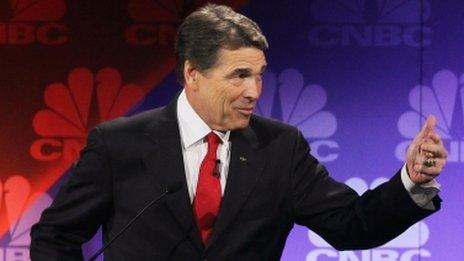Profile: Rick Perry
- Published
Rick Perry could not remember the third government department he plans to abolish if elected president - Footage courtesy of CNBC.com
To his supporters, he was the man who fixed Texas and could answer the country's economic prayers.
But to his detractors, Texas Governor Rick Perry was a dim bulb in cowboy boots whose softness on illegal immigration and pay-to-play statehouse politics made him unfit for America's highest office.
The Texas governor ticked many of the boxes on the Republican Party's wish list. He's a socially conservative Christian with a record of cutting spending and restricting access to abortion, who could boast that he restored to health the finances of the second largest state in the US without raising taxes.
He married his childhood sweetheart and has the kind of chiselled looks made for Mount Rushmore. And he has a personal narrative that millions of Americans could relate to - a humble childhood on a Texan cotton farm.
Humble childhood
Mr Perry began his political career as a conservative Democrat in the state legislature before switching parties and running for statewide office.
He served as state agricultural commissioner and lieutenant governor under then-Governor George Bush, whom he succeeded in 2000.
Mr Perry was re-elected twice and, critics say, enforced a hard-nosed, pay-to-play culture in the state capital, in which groups and businesses who wanted something from state government had to contribute to his political efforts.
In Texas, he vetoed a ban on putting to death convicts found to be "mentally retarded" and there have been more than 200 executions during his governorship.
On one occasion he made comments that seemed to endorse the movement in Texas to break away from the union.
And he once said that he shot a coyote while out jogging, using a semi-automatic Ruger handgun that he was carrying.
Mr Perry entered national politics for the first time in August 2012 when he jumped into the Republican Party's nomination race. Voters greeted him as a conservative alternative to Mitt Romney, the former Massachusetts governor and presumed frontrunner. He immediately soared to the top of the polls and began hauling in campaign cash.
Mr Perry sought to run on a record of job creation and fiscal discipline in Texas, potentially attractive accomplishments to an electorate that was deeply anxious about the economy and the government's budget deficit.
Some analysts wondered whether the US was ready for another Texan president, so soon after George W Bush, who ended his second term deeply unpopular, even in his own party.
Soon after it began, Mr Perry's candidacy suffered a series of miserable debate performances.
His campaign disintegrated spectacularly after he forgot the third of three federal departments he had pledged to close, muttering "oops" while debating with his rivals live on television.
After poor showings in the Iowa caucuses and the New Hampshire primary, early tests in the party nomination races, Mr Perry withdrew. Mr Romney won the Republican nomination and lost the election to President Barack Obama.
In July 2013, Mr Perry announced that he would retire from the Texas governor's office instead of seeking a fourth term.
As he began to travel to key presidential battleground states again in 2014, possibly considering another bid for president, Mr Perry was indicted by a Texas grand jury on abuse of power charges.
He is accused of improperly blocking funding for an anti-corruption unit in a dispute with a political adversary.
But Mr Perry has defiantly denied wrongdoing and has told supporters he will "prevail" over the charges.
- Published10 November 2011

- Published10 November 2011